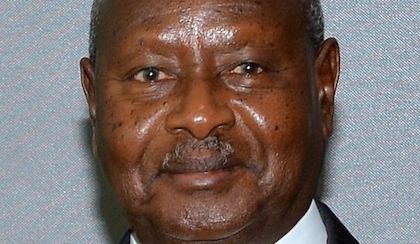Yoweri Museveni. Photo: Wikimedia Commons/U.S. State Department
Uganda’s government is held captive to the famous words of Sir Walter Scott, “Oh, what a tangled web we weave, when first we practice to deceive!”
It has become customary for ruling National Resistance Movement (NRM) party functionaries to make fools of themselves by trying to outdo one another in sounding more ridiculous as they debase themselves to impress President Yoweri Museveni as loyalists.
Most recently, this has taken on the insidious and invidious proportions of sheer lunacy. Take what the Inspector General of Uganda Police Martin Ochola said recently: “We have been beating journalists to restrain them from going where there’s danger. Police beat journalists to help them…for their own safety. When a police officer tells you to stop, you must stop for your own safety. I won’t apologize for police actions.”
It boggles the mind how the national police commander, a lawyer who knows the spirit and letter of the 1995 Uganda constitution, can even allow such words to be uttered, let alone say them himself!
Martin Ochola has now joined government spin-doctors like Andrew Mwenda who will say that Ugandans are doing well because they can afford smartphones and data to log onto social media to express how badly they are doing. Only in Uganda can the trees be mistaken for the forest with such blissful disregard for what makes sense and what does not.
President Museveni and his attack dogs like Mwenda have even said Ugandans are rich because they drive cars. It is true, there are plenty of cars on our roads. Traffic congestion has clogged our roads, often leading to gridlock. However, our president and his merry band of sycophants say this is a sign of progress.
It means more people can afford to buy cars, hence “the jams.” Of course this argument is a piece of brilliant sophistry, and thus too clever by half. I am sorry, but some of us were under the impression that progress meant better schools with higher enrollment; a health care system that is not in comatose; higher employment, which in turn supports a superstructure based on solid social institutions predicated on a concrete economic base.
But hey, cars will do too. I mean, they reinforce the mistaken stereotype that African people love to look good before they make good. This is done by their exhibiting capitalistic greed instead of capitalist innovation. Especially through pursuing the material or symbolic rewards of status and power instead of mastering their origins.
Where billionaire investor Warren Buffett famously still lives in the home he bought in 1958 for $31,500, an African plutocrat-wannabe will live in a mansion on a Mandazi budget. Then, the NRM oligarchy will call it “progress”.
Such “progress” is also evidenced in the youth having smartphones and data to log onto social media. Well, that’s what I hear Andrew Mwenda telling us. Indeed, he is right. The opponents of Museveni are deluded to think that they are not benefiting from this regime when they have access to abusing him every day, in spite of our benevolent OTT (the tax on access to social media)!
That was sarcasm on my part.
In George Orwell’s classic book “Animal Farm”, there was a pig called Squealer. He was so clever that he “could turn black into white.” Throughout Orwell’s seminal novel, Squealer effectively cuts his teeth as the head pig’s— Napoleon—mouthpiece and Minister of Propaganda. This constant harping on how good we have it, even when we feel bad about how good we have it, is a sign that Squealer exists and is personified by the NRM and its associates and apologists.
Isn’t it any wonder that African states are an adjunct to or definitive of a permanent underclass? There are war crimes and crimes against humanity convulsing the Congo. While Southern Sudan is continually on a hair trigger. Of course, there are political tinderboxes outside Africa. But the volatility on the African continent is perennial.
Many people have analyzed, chastised and agonized on what ails Africa. So I won’t attempt the same. However, I will relate this anecdote:
Years ago, after the death of Nelson Mandela, I was watching CNN and listening to a succession of talking heads, and heads of state, eulogized him.
Then, John Mahama spoke. Not knowing him then, I asked a friend nearby: “Who’s that guy?”
My friend looked at me and said matter-of-factly, “The president of Sierra Leone.”
Then another guy chimed in with a correction, “No. He’s the president of Ghana.”
I was stunned. How could I have not known that?
Ghana is a leading African nation. A reference point on how well a democracy can function in Africa. So what explains my ignorance? That’s when it hit me: my ignorance explains Ghana’s success. Because Africa is straddled by “Big Men”. And these so called Big Men dwarf our legal-formal institutions. Thereby, they personify the state.
So, in our context, to know of a failed democracy is to know its leader. That’s why I didn’t know Ghana’s head of state. Because Ghana’s democratic institutions actually work. Ghana is not a one-person show.
That’s why they had dwarfed their leader into his rightful role: a mere cog in the machine of the Ghanaian governmental experiment. Thus, he was not in the news nor was he news worthy. Since, frankly, African news is increasingly bad news.
Especially when that news focuses on mobile phones and cars as signs of progress. In Uganda, you can bet that such focus is even more telling of the nature and depredations of a failed state.
A state which, to borrow President Museveni’s own words, is ideologically bankrupt. Come Thursday when the nation votes, the NRM wants to prolong this agony.
The columnist Matogo can be reached via mugashop74@gmail.com







